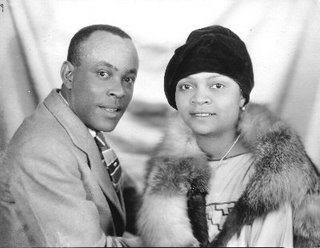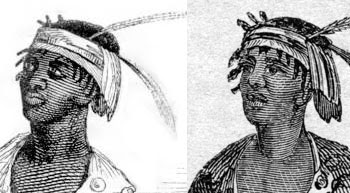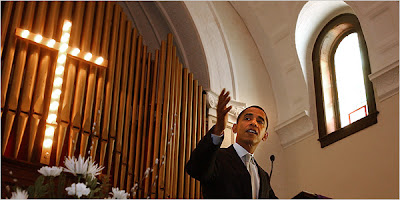CHICAGO — Members of Trinity United Church of Christ squeezed into a downtown hotel ballroom in early March to celebrate the long service of their pastor, the Rev. Jeremiah A. Wright Jr. One congregant stood out amid the flowers and finery: Senator Barack Obama, there to honor the man who led him from skeptic to self-described Christian.
Twenty years ago at Trinity, Mr. Obama, then a community organizer in poor Chicago neighborhoods, found the African-American community he had sought all his life, along with professional credibility as a community organizer and an education in how to inspire followers. He had sampled various faiths but adopted none until he met Mr. Wright, a dynamic pastor who preached Afrocentric theology, dabbled in radical politics and delivered music-and-profanity-spiked sermons.

Trinity United Church of Christ/Religion News Service
In Chicago, Mr. Obama embraced Christianity under the tutelage of the Rev. Jeremiah A. Wright Jr., known for sometimes inflammatory views.
Few of those at Mr. Wright’s tribute in March knew of the pressures that Mr. Obama’s presidential run was placing on the relationship between the pastor and his star congregant. Mr. Wright’s assertions of widespread white racism and his scorching remarks about American government have drawn criticism, and prompted the senator to cancel his delivery of the invocation when he formally announced his candidacy in February.
Mr. Obama, a Democratic presidential candidate who says he was only shielding his pastor from the spotlight, said he respected Mr. Wright’s work for the poor and his fight against injustice. But “we don’t agree on everything,” Mr. Obama said. “I’ve never had a thorough conversation with him about all aspects of politics.”
It is hard to imagine, though, how Mr. Obama can truly distance himself from Mr. Wright. The Christianity that Mr. Obama adopted at Trinity has infused not only his life, but also his campaign. He began his presidential announcement with the phrase “Giving all praise and honor to God,” a salutation common in the black church. He titled his second book, “The Audacity of Hope,” after one of Mr. Wright’s sermons, and often talks about biblical underdogs, the mutual interests of religious and secular America, and the centrality of faith in public life.
The day after the party for Mr. Wright, Mr. Obama stood in an A.M.E. church pulpit in Selma, Ala., and cast his candidacy in nothing short of biblical terms, implicitly comparing himself to Joshua, known for his relative inexperience, steadfast faith and completion of Moses’ mission of delivering his people to the Promised Land.
“Be strong and have courage, for I am with you wherever you go,” Mr. Obama said in paraphrasing God’s message to Joshua.
It is difficult to tell whether Mr. Obama’s religious and political beliefs are fused or simply run parallel. The junior senator from Illinois often talks of faith as a moral force essential for solving America’s vexing problems. Like Senator Hillary Rodham Clinton of New York and John Edwards, his fellow Democratic candidates, he expresses both a political and a religious obligation to help the downtrodden. Like conservative Christians, he speaks of AIDS as a moral crisis. And like his pastor, Mr. Obama opposes the Iraq war.
His embrace of faith was a sharp change for a man whose family offered him something of a crash course in comparative religion but no belief to call his own. “He comes from a very secular, skeptical family,” said Jim Wallis, a Christian antipoverty activist and longtime friend of Mr. Obama. “His faith is really a personal and an adult choice. His is a conversion story.”
The grandparents who helped raise Mr. Obama were nonpracticing Baptists and Methodists. His mother was an anthropologist who collected religious texts the way others picked up tribal masks, teaching her children the inspirational power of the common narratives and heroes.
His mother’s tutelage took place mostly in Indonesia, in the household of Mr. Obama’s stepfather, Lolo Soetoro, a nominal Muslim who hung prayer beads over his bed but enjoyed bacon, which Islam forbids.
“My whole family was Muslim, and most of the people I knew were Muslim,” said Maya Soetoro-Ng, Mr. Obama’s younger half sister. But Mr. Obama attended a Catholic school and then a Muslim public school where the religious education was cursory. When he was 10, he returned to his birthplace of Hawaii to live with his grandparents and attended a preparatory school with a Christian affiliation but little religious instruction.

Evelyn Hockstein for The New York Times
Sarah Hussein Obama of Kenya, Barack Obama’s stepgrandmother, is a lifelong Muslim. “I am a strong believer of the Islamic faith,” she says.
Years later, Mr. Obama met his father’s family, a mix of Muslim and Christian Kenyans. Sarah Hussein Obama, who is his stepgrandmother but whom Mr. Obama calls his grandmother, still rises at 5 a.m. to pray before tending to her crops and the three orphans she has taken in.
“I am a strong believer of the Islamic faith,” Ms. Obama, 85, said in a recent interview in Kenya.
From Skepticism to Belief
This polyglot background made Mr. Obama tolerant of others’ faiths yet reluctant to join one, said Mr. Wright, the pastor. In an interview in March in his office, filled with mementos from his 35 years at Trinity, Mr. Wright recalled his first encounters with Mr. Obama in the late 1980s, when the future senator was organizing Chicago neighborhoods. Though minister after minister told Mr. Obama he would be more credible if he joined a church, he was not a believer.
“I remained a reluctant skeptic, doubtful of my own motives, wary of expedient conversion, having too many quarrels with God to accept a salvation too easily won,” he wrote in his first book, “Dreams From My Father.”
Still, Mr. Obama was entranced by Mr. Wright, whose sermons fused analysis of the Bible with outrage at what he saw as the racism of everything from daily life in Chicago to American foreign policy. Mr. Obama had never met a minister who made pilgrimages to Africa, welcomed women leaders and gay members and crooned Teddy Pendergrass rhythm and blues from the pulpit. Mr. Wright was making Trinity a social force, initiating day care, drug counseling, legal aid and tutoring. He was also interested in the world beyond his own; in 1984, he traveled to Cuba to teach Christians about the value of nonviolent protest and to Libya to visit Col. Muammar el-Qaddafi, along with the Nation of Islam leader Louis Farrakhan. Mr. Wright said his visits implied no endorsement of their views.
Followers were also drawn simply by Mr. Wright’s appeal. Trinity has 8,500 members today, making it the largest American congregation in the United Church of Christ, a mostly white denomination known for the independence of its congregations and its willingness to experiment with traditional Protestant theology.
Mr. Wright preached black liberation theology, which interprets the Bible as the story of the struggles of black people, whom by virtue of their oppression are better able to understand Scripture than those who have suffered less. That message can sound different to white audiences, said Dwight Hopkins, a professor at University of Chicago Divinity School and a Trinity member. “Some white people hear it as racism in reverse,” Dr. Hopkins said, while blacks hear, “Yes, we are somebody, we’re also made in God’s image.”
Audacity and Hope
It was a 1988 sermon called “The Audacity to Hope” that turned Mr. Obama, in his late 20s, from spiritual outsider to enthusiastic churchgoer. Mr. Wright in the sermon jumped from 19th-century art to his own youthful brushes with crime and Islam to illustrate faith’s power to inspire underdogs. Mr. Obama was seeing the same thing in public housing projects where poor residents sustained themselves through sheer belief.
In “Dreams From My Father,” Mr. Obama described his teary-eyed reaction to the minister’s words. “Inside the thousands of churches across the city, I imagined the stories of ordinary black people merging with the stories of David and Goliath, Moses and Pharaoh, the Christians in the lion’s den, Ezekiel’s field of dry bones,” Mr. Obama wrote. “Those stories — of survival, and freedom, and hope — became our story, my story.”
Mr. Obama was baptized that year, and joining Trinity helped him “embrace the African-American community in a way that was whole and profound,” said Ms. Soetoro, his half sister.
It also helped give him spiritual bona fides and a new assurance. Services at Trinity were a weekly master class in how to move an audience. When Mr. Obama arrived at Harvard Law School later that year, where he fortified himself with recordings of Mr. Wright’s sermons, he was delivering stirring speeches as a student leader in the classic oratorical style of the black church.
But he developed a tone very different from his pastor’s. In contrast with Mr. Wright — the kind of speaker who could make a grocery list sound like a jeremiad — Mr. Obama speaks with cool intellect and on-the-one-hand reasoning. He tends to emphasize the reasonableness of all people; Mr. Wright rallies his parishioners against oppressors.
While Mr. Obama stated his opposition to the Iraq war in conventional terms, Mr. Wright issued a “War on Iraq I.Q. Test,” with questions like, “Which country do you think poses the greatest threat to global peace: Iraq or the U.S.?”
In the 16 years since Mr. Obama returned to Chicago from Harvard, Mr. Wright has presided over his wedding ceremony, baptized his two daughters and dedicated his house, while Mr. Obama has often spoken at Trinity’s panels and debates. Though the Obamas drop in on other congregations, they treat Trinity as their spiritual home, attending services frequently. The church’s Afrocentric focus makes Mr. Obama a figure of particular authenticity there, because he has the African connections so many members have searched for.
To the many members who, like the Obamas, are the first generation in their families to achieve financial success, the church warns against “middleclassness,” its term for selfish individualism, and urges them to channel their gains back into the community.
Mr. Obama has written that when he became a Christian, he “felt God’s spirit beckoning” and “submitted myself to His will and dedicated myself to discovering His truth.” While he has said he shares core Christian beliefs in God and in Jesus as his resurrected son, he sometimes mentions doubts. In his second book, he admitted uncertainty about the afterlife, and “what existed before the Big Bang.” Generally, Mr. Obama emphasizes the communal aspects of religion over the supernatural ones.
Bridging Religious Divides
He has said that he relies on Mr. Wright to ensure “that I am speaking as truthfully about what I believe as possible.” He tends to turn to his minister at moments of frustration, Mr. Wright said, such as when Mr. Obama felt a Congressional Black Caucus meeting was heavier on entertainment than substance.
As a presidential candidate, Mr. Obama is reaching out to both liberal skeptics and committed Christians. In many speeches or discussions, he never mentions religion. When Mr. Obama, a former constitutional law professor, does speak of faith, he tends to add a footnote about keeping church and state separate.
But he also talks of building a consensus among secular liberal and conservative Christian voters. Mr. Wallis, the antipoverty advocate who calls himself a “progressive evangelical,” first met Mr. Obama 10 years ago when both participated in traveling seminars on American civic life. On bus rides, Mr. Wallis and Mr. Obama would huddle, away from company like George Stephanopoulos and Ralph Reed, to plot building a coalition of progressive and religious voters.
“The problems of poverty and racism, the uninsured and the unemployed, are not simply technical problems in search of the perfect 10 point plan,” Mr. Obama says in one of his standard campaign lines. “They are rooted in both societal indifference and individual callousness — in the imperfections of man.”
He often makes reference to the civil rights movement, when liberals used Christian rhetoric to win change.
Mr. Obama reassures liberal audiences about the role of religion in public life, and he tells conservative Christians that he understands why abortion horrifies them and why they may prefer to curb H.I.V. through abstinence instead of condoms. AIDS has spread in part because “the relationship between men and women, between sexuality and spirituality, has broken down, and needs to be repaired,” he said to thunderous applause in December at the megachurch in California led by the Rev. Rick Warren, a best-selling author.
At the same time, Mr. Obama’s ties to Trinity have become more complicated than those simply of proud congregation and favorite son. Since Mr. Obama announced his candidacy, the church has received threatening phone calls. On blogs and cable news shows, conservative critics have called it separatist and antiwhite.
Congregants respond by saying critics are misreading the church’s tenets, that it is a warm and accepting community and is not hostile to whites. But Mr. Wright’s political statements may be more controversial than his theological ones. He has said that Zionism has an element of “white racism.” (For its part, the Anti-Defamation League says it has no evidence of any anti-Semitism by Mr. Wright.)
On the Sunday after the terrorist attacks of 9/11, Mr. Wright said the attacks were a consequence of violent American policies. Four years later he wrote that the attacks had proved that “people of color had not gone away, faded into the woodwork or just ‘disappeared’ as the Great White West went on its merry way of ignoring Black concerns.”
Provocative Assertions
Such statements involve “a certain deeply embedded anti-Americanism,” said Michael Cromartie, vice president of the Ethics and Public Policy Center, a conservative group that studies religious issues and public policy. “A lot of people are going to say to Mr. Obama, are these your views?”
Mr. Obama says they are not.
“The violence of 9/11 was inexcusable and without justification,” he said in a recent interview. He was not at Trinity the day Mr. Wright delivered his remarks shortly after the attacks, Mr. Obama said, but “it sounds like he was trying to be provocative.”
“Reverend Wright is a child of the 60s, and he often expresses himself in that language of concern with institutional racism and the struggles the African-American community has gone through,” Mr. Obama said. “He analyzes public events in the context of race. I tend to look at them through the context of social justice and inequality.”
Despite the canceled invocation, Mr. Wright prayed with the Obama family just before his presidential announcement. Asked later about the incident, the Obama campaign said in a statement, “Senator Obama is proud of his pastor and his church.”
In March, Mr. Wright said in an interview that his family and some close associates were angry about the canceled address, for which they blamed Obama campaign advisers but that the situation was “not irreparable,” adding, “Several things need to happen to fix it.”
Asked if he and Mr. Wright had patched up their differences, Mr. Obama said: “Those are conversations between me and my pastor.”
Mr. Wright, who has long prided himself on criticizing the establishment, said he knew that he may not play well in Mr. Obama’s audition for the ultimate establishment job.
“If Barack gets past the primary, he might have to publicly distance himself from me,” Mr. Wright said with a shrug. “I said it to Barack personally, and he said yeah, that might have to happen.”
 Copyright by r2c2h2
Copyright by r2c2h2



































